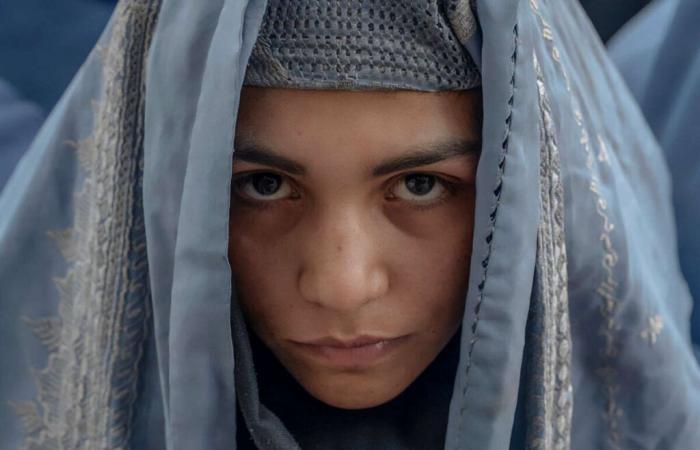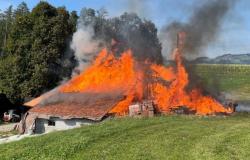They are now forbidden from speaking, singing and reading in public. Afghan women have almost no freedom anymore because of a law to “prevent vice”. Solène Chalvon-Fioriti, the author of remarkable films on Afghanistan, sheds light on their inexorable situation.

Since the Taliban returned to power in August 2021, girls can no longer go to school after the age of 12. In some areas in the south of the country, it is even at age 10. Photo by Veronique de Viguerie
By Emmanuelle Skyvington
Published on August 30, 2024 at 3:41 p.m.
DSince August 22, the Taliban have enacted an “antivice” law that removes Afghan women’s right to sing or read aloud, and even to speak outside their homes. Solène Chalvon-Fioriti has lived in Afghanistan and made remarkable films (Afghan womengrand prize of Figra 2024, finalist of the Bayeux war correspondents’ prize 2023, Afghanistan : Radio begumthe voice of the resistance…). She deciphers the terrifying situation of women in this country.
The Taliban regime has announced the promulgation of a law aimed at “preventing vice and promoting virtue”. Women are the target of the 35 articles – all in accordance with ultra-rigorous Sharia law – which prohibit them from moving alone, speaking, singing, reading in public… How did you react to the announcement of this text?
No surprise, unfortunately. I say this without any cynicism. Quite simply because for three years, the Taliban have imposed dozens of bans on the issue of women’s rights in Afghanistan. When they returned to power in August 2021, there was a false “honeymoon” of a few weeks during which they left women alone. We naively believed that they had changed. Then they returned, in all respects, to the laws that had been passed in the 1990s. Laws that are unique in the world in the most discriminatory country on the planet! Nowhere else are girls banned from going to school after the age of 12! In some areas in the south of the country, this age has even been lowered to 10. The Taliban are even closing primary schools in some localities. One of their arguments is to claim that the corpus of school textbooks is indexed on texts written by Western NGOs. For them, in any case, everything is always “the fault of the West”.
In 2024, Afghan women are banned from everything. The only right they have left is to wash their clothes in the river. But the Taliban can ban them from that too, just like banning girls from school altogether. It can happen. They will answer that girls can learn to read in the madrassa (Koranic school).
The Taliban are now trying to close off all spaces where Afghan women can be strong women.
For three years, women’s rights have already been extremely limited. Why this new layer of restrictions?
What they want is to terrorize women, to show them that there is no option for any kind of freedom. They are provocative towards them. In fact, the Taliban are afraid of women: Afghan women surprised them. They did not expect the extraordinary resonance of social networks around their resistance. They did not imagine that women would demonstrate in the streets. Today they are trying to prohibit all the spaces where Afghan women can be strong women. This is a crucial issue for them: part of the control of the country goes through the control of women. Some articles are absurd: “not to express oneself or speak in public spaces”. In Kabul, you can see posters with girls in burqas and the words “stay silent”. In Afghanistan, there is already a great deal of reserve on the streets: women do not burst out laughing in public spaces. They do not even show their teeth when smiling broadly. With these measures, the Taliban government is targeting women’s rights activists. Is it forbidden to read outside? But then again, no girl reads outside. There are no gardens, women are banned from national parks, banned from lakes. There is no place where they could read outside. This law means that they do not even have the right to dream of these spaces. It corresponds to the very rigid line of the south of the country, and that of Emir Haibatullah Akhundzada, which has spread throughout the country. This movement has no reason to disintegrate in the near future.

In Kabul, three years ago, against the presence of women in public spaces: photos of models were defaced on store fronts. Photo Sandra Calligaro
What can the international community do to help Afghan women?
She is stuck and divided between those who believe that the Taliban must be completely isolated and those, more pragmatic, who think that isolation is useless, because, in the end, it always affects… girls. While the country is seriously impoverished, it is always the girls who eat less than the others. If the international community makes development aid conditional on women’s rights, we will be caught out in our own game. Let us recall that in three years there has been no compromise on the part of the Taliban, nor any backtracking on their “Highway of eternal confinement” women. They have not reversed any of their decrees. If the international community stops giving lifesaving drugs to a country where more than one in two people live in extreme poverty, the Taliban are not going to change their policy towards women. So it is a very dangerous game…
The UN held an international meeting on June 30 in Doha to advocate a “new era of cooperation,” accepting the Taliban’s conditions: the absence of women in a debate exclusively reserved for men. What do you think?
For many Afghan women, this is truly a slap in the face. A slap that makes those who have been fighting for twenty years to exist as adult and politicized women, and not as “little Afghan girls with their burqa”. They need international solidarity. In April 2023, we created the collective “Welcoming Afghan Women” with journalists (Margaux Benn, Sonia Ghezali and Nassim Majidi) and France Terre d’asile. Other European collectives have been created. Today, the European Union encourages sovereign countries to grant systematic asylum to Afghan women on the issue of gender.
Also read:
Reporters Without Borders warns of persecution of journalists in Afghanistan
This is now the case in France since last July, the CNDA (National Court of Asylum) has recognised “the membership of all Afghan women in a social group that can be protected”…
This is an excellent decision, which must now be accompanied by other administrative measures, so that these Afghan women who want to leave do not have to wait, alone, for weeks, in transit countries, to obtain their papers for France. It is not very complicated: we would have to put more staff in the French consulates to process their files quickly.
Télérama Dialogues returns on September 23
Actors, authors, comedians… Like every year, Télérama invites around thirty artists and intellectuals to the Théâtre du Rond-Point to spend a whole day talking with our journalists and the public.
Reservations






